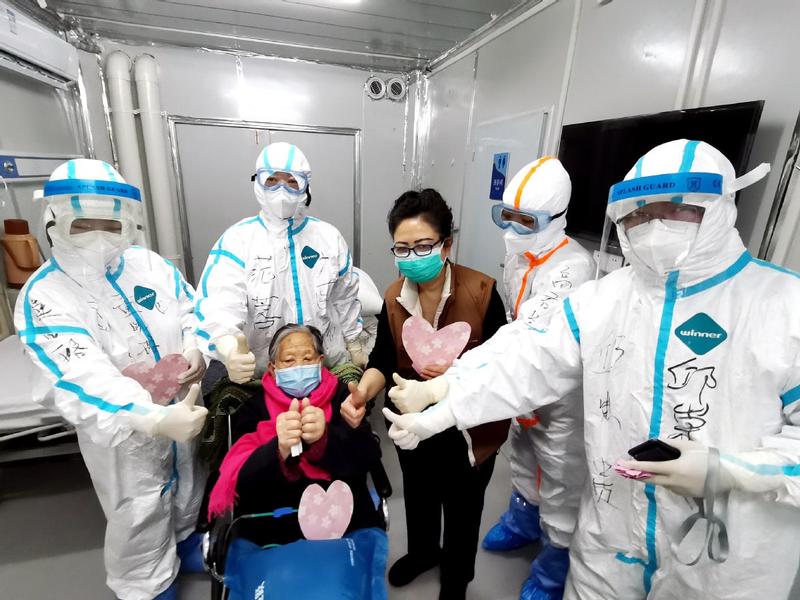 An elderly woman and her daughter pose for a photo with medics at Leishenshan Hospital in Wuhan, Central China's Hubei province, on March 1, 2020. (GAO XIANG / CHINADAILY.COM.CN)
An elderly woman and her daughter pose for a photo with medics at Leishenshan Hospital in Wuhan, Central China's Hubei province, on March 1, 2020. (GAO XIANG / CHINADAILY.COM.CN)
Chinese authorities in charge of epidemic control, borders and points of entry have enhanced surveillance and public health efforts, taking a proactive approach to contain the risk of the novel coronavirus outbreak from inside and outside the country.
Qingtian county in Zhejiang province reported seven new confirmed cases of infections, all from Italy, on Tuesday, bringing the total number of imported novel coronavirus cases in the province to eight. Previously, infections were also found among people who traveled from the United Kingdom and Iran to Shenzhen, in Guangdong province, Beijing and the Ningxia Hui autonomous region.
With regard to the new cases in Qingtian, a county known for its residents' tradition of seeking business opportunities overseas, the patients are Chinese citizens who worked at a restaurant in the northern Italian city of Bergamo, which reported 243 cases as of Monday.
Zeng Guang, chief epidemiologist at the Chinese Center for Disease Control and Prevention, called for strengthened international health and quarantine measures. "Foreigners and Chinese citizens should be treated alike when it comes to epidemic control measures, particularly for those from countries and regions hit hard by the virus," Zeng said.
Qingtian county in Zhejiang province reported seven new confirmed cases of infections, all from Italy, on Tuesday, bringing the total number of imported novel coronavirus cases in the province to eight.
Measures such as conducting temperature checks and inquiring about previous infections and which country travelers had departed from should be conducted meticulously by customs authorities, he said.
ALSO READ: China works to curb imports of infections
In Qingtian, the local government has sent work teams to airports in Shanghai, Hangzhou and Wenzhou to transport the county's residents returning from overseas.
The county has around 330,000 residents who live and work overseas. Since the epidemic broke out in Wuhan, Hubei province, in early January, they have contributed to the country's fight against the virus, including making donations.
Zhang Weihua, Party secretary of Qingtian Federation of Returned Overseas Chinese, called on all overseas returnees to follow the guidance, have medical checkups and get quarantined for 14 days before going home.
Last week, renowned respiratory expert Zhong Nanshan said at a news conference in Guangzhou, Guangdong province, that as the global epidemic worsens, China will possibly see a rise in imported novel coronavirus cases.
Other regions in China, including Beijing, Shanghai, Chongqing, Qingdao, Yantai and Weihai in Shandong province, and Xiamen in Fujian province, have introduced 14-day quarantines and other measures for those arriving from overseas, particularly from epidemic-stricken regions.
In Chongqing, all passengers aboard flight CA440 from the Republic of Korea on Sunday, were tested for the virus after four passengers were found to have a fever. All tested negative. Similarly, in Dandong, Liaoning province, which borders the Democratic People's Republic of Korea, the local authorities offered free tests to all passengers arriving from outside the country after Feb 12.
READ MORE: China seeking joint efforts over outbreak
People from the ROK can make reservations using a WeChat mini-program named Suikang to buy face masks in Guangzhou, capital of Guangdong. The mini-program, operated by the city government, launched its Korean language version on Monday. Versions in other languages, such as English and Japanese, will be made available in the following weeks.
ROK citizens can register with their passport numbers on the mini-program to make reservations for mask purchases.
They will also be given a special health code after using the app to report their health condition. With the code, ROK citizens can enter housing and office complexes the same way as their Chinese counterparts.
Guangdong Provincial Office of Foreign Affairs has opened a 24-hour hotline in English and Chinese for foreigners to inquire about the epidemic situation and anti-epidemic measures in the province. Major airlines will inform foreign passengers on board about measures and regulations Guangdong has introduced to help prevent and control the epidemic.
Contact the writers at mazhenhuan@chinadaily.com.cn


